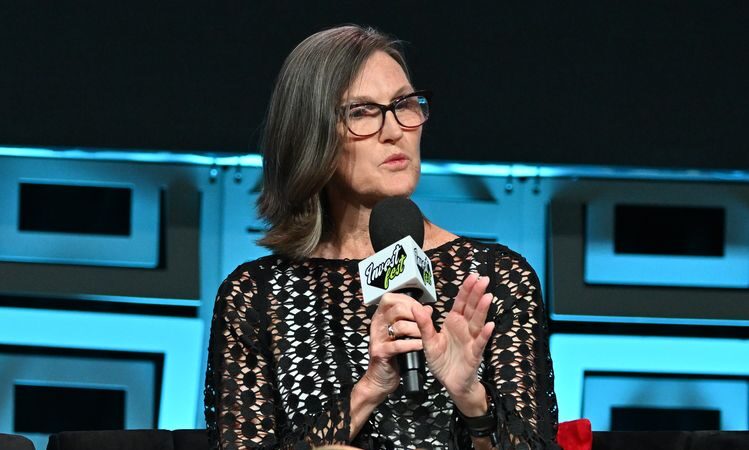
Breaking into Europe’s competitive exchange traded funds market has been a long-standing ambition for ARK Invest, the US firm founded by star portfolio manager Cathie Wood in 2014.
A decade after Wood broke away from AllianceBernstein to strike out on her own, her firm now oversees around $25bn — although that figure is down from a peak of more than $60bn in February 2021.
Having attracted tens of billions of dollars from a loyal base of US investors, ARK has now shifted attention on replicating its success in the European market. On 20 September it announced it had acquired London-based Rize ETF to assist its push.
“We have been looking at the European market for some time,” Tom Staudt, chief operating officer at ARK Invest told Financial News.
The acquisition of Rize, which manages around $450m across 11 European ETFs, will also see ARK work closely with City veteran Martin Gilbert, whose AssetCo business sold its majority stake in Rize. AssetCo acquired a 63% majority stake in Rize in 2021 for £16.5m.
River and Mercantile, which AssetCo acquired last year, will launch its own ETFs on Rize’s platform following the deal.
READ ARK’s Cathie Wood on why the asset manager is still bullish on crypto
ARK’s purchase of Rize was brokered in “a matter of months”, according to Michael O’Riordan, founding partner of consultancy Blackwater Search & Advisory who introduced the two firms.
O’Riordan added that ARK’s decision to acquire an existing ETF player, rather than build a business from scratch in Europe, meant it got instant access to boots on the ground and knowledge of the local market.
“In the case of ARK, they have a lot of products and ambitions to launch more. It made more sense to have their own platform,” said O’Riordan.
“For a lot of US managers with intentions of coming to Europe, the idea of starting from scratch can be intimidating. If they can get access to a team straightaway, that is more appealing.”
For Rize, which was founded in 2019 by a group of former Legal & General Investment Management professionals, the deal will eventually see it rebranded to ARK Invest Europe and provide the firepower needed to grow assets and gain a foothold with key distributors.
“When you are a small player in the ETF market, it can be a bit like David versus Goliath. Having a brand like ARK can be a game changer,” said O’Riordan.
ARK’s push into Europe is a logical next step, according to Staudt. Around 25% of inbound emails, social media engagements and contacts currently originate from continental Europe and the UK.
“That’s without us having a formal presence or product on the continent,” he said. “We have a strong belief there is unmet demand.”
Staudt pointed to other partnerships outside the US market where it has had success, including a tie-up with Nikko Asset Management in Japan.
READ How DWS plans to take on Amundi and win back its prized ETF spot
Nikko Asset Management acquired a 15% holding in ARK Invest in 2017 after working with the firm on a fund to sell to the Japanese market.
“We are not the typical US player that has been solely confined to the US,” said Staudt.
“We have had great success in non-US markets where we have had the right partners.”
ARK will be entering Europe’s $1.5tn ETF sector at a fiercely competitive time. The top three players in the region — iShares, Amundi and Xtrackers — command a 68.2% share of the market, according to ETFGI.
Flows into ARK’s US ETFs have also stuttered more recently.
Having pulled in more than $20bn of new money in 2020, net inflows dropped to $8.5bn in 2021, according to figures from ETFGI. Last year it recorded net outflows of $655m, and so far this year its ETFs have bled $689m.
Despite the presence of heavyweight incumbents in Europe, ARK hopes to win a share of the growing retail segment, as a younger cohort of investors enter ETFs “in numbers the European market has not seen before”, said Staudt.
ETFs in Europe attract a larger share of institutional money, but with wealth managers and online investment platforms showing greater interest in low-cost passive products, retail appetite is on the increase.
“The top five players in the US still have a massive market share. But what is different in Europe is we believe we are in the very early innings of online distribution platforms. In the US that is more mature,” said Staudt.
ARK also expects there will be demand for the type of ETFs it provides in the US, which are actively managed and heavily weighted towards large tech companies such as Tesla and Coinbase.
“We think younger, longer time horizon, tech-savvy, innovation aware investors are going to look to have those types of exposures in their portfolios,” said Staudt.
While active ETFs are gaining momentum in the US — there were around 275 of these products launched in 2022, according to data from research firm ETFGI — the pace is much slower in Europe.
Just 21 active ETFs were rolled out across the region last year, ETFGI figures show.
“When we launched in the US, all of the large institutions said active equity ETFs were a non-existent market. But we wanted to help build that market. There are markets in Europe where there is a hunger for strategies like this.”
Jose Garcia Zarate, associate director of passive strategies at Morningstar, said while thematic ETFs are attracting investors in Europe, there are not yet “a mainstream investment”, representing around 2.3% of the region’s market.
“To ARK´s advantage, [they] have a following among a certain kind of investor and it seems that this extends to Europe. That could give them a bit of an edge to grow within that niche,” he said.
To contact the author of this story with feedback or news, email David Ricketts






